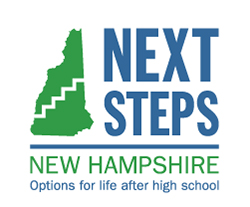Keene State Helps Students with Disabilities Become College and Career Ready

Students with disabilities are less likely than their peers to graduate from high school, and they’re less likely to get good jobs. But there’s hope: Good transition planning, better prepared teachers, more learning experiences for students outside the classroom, and better engagement with families are proven to help these at-risk students.
And Keene State is deeply involved in bringing those effective strategies to New Hampshire students and educators. Under the title “Next Steps NH,” the US Department of Education, Bureau of Special Education, awarded New Hampshire $3.8 million over a six-year period to increase the college and career readiness of New Hampshire students with disabilities and those at risk of dropping out of school. Keene State was awarded approximately $400,000 (over five years) to work as a partner with the NH Department of Education, the Parent Information Center, regional intermediary agencies who work directly with high schools, Plymouth State, and the UNH Institute on Disability.
“We’re excited to be part of a statewide effort to improve post high school outcomes for students with disabilities,” said Steve Bigaj, project director and professor of Education at Keene State. “As a team we’ve created systems, models, and procedures for improving curriculum and programs, and we’ve created solid networks that will be in place long after the project ends.”
To accomplish this goal, the project worked with a total of 16 New Hampshire high schools for two years each, helping them assess their current transition planning efforts and develop action plans for improvement. Next Steps NH then provided ongoing coaching and training to the schools as they completed their action plans.
“Transition planning is everything that goes into a student, their teachers, and their families planning for life after school,” explained Betsy Street, project leader for Professional and Graduate Studies. “This can be anything from a four-year college to a one-year vocational program to an active life in the community – in good transition planning, the goals are established by the student. It is their life after all!”
Keene State’s role in the project is three-fold: 1) We are a full project partner and part of planning and implementing all the project activities; 2) We’ve developed an online Transition Resource Portal for educators, parents, and students with disabilities planning for life after high school to use as a teaching and learning tool; and 3) We’ve improved our teacher training programs to include more college- and career-ready concepts and practice in our coursework and field experiences.
Keene State was primarily responsible for creating the Transition Resource Portal, which consists of the Next Steps NH website, the BeyondClassroom website, and a Facebook page and Twitter account. The websites house all the project tools, training, and coaching materials developed over the last five years. In addition, the Next Steps website is an extensive reference for all aspects of transition planning. It has become a nationwide resource – almost half the users come from outside NH. The BeyondClassroom website is a resource for teachers and families on extended learning opportunities (ELOs), which are credit-bearing learning experiences that take place outside the traditional high school classroom.
Keene State also led the development of special education transition competencies that describe the transition skills and knowledge a beginning special educator should have. “Each year we assess our progress against the competencies and make a plan to get to the next level,” Street said. “There is now tight integration and reinforcement between coursework and field experiences. In our second year Plymouth State joined the project, and we have been mentoring their faculty as they assess needs and develop an action to improve their program. We share resources and approaches.”
Though the grant was scheduled to end on June 30, 2017, NH was awarded a one-year extension to continue the work through June 30, 2018, and the Keene State team expects to get $121,000 of that.





